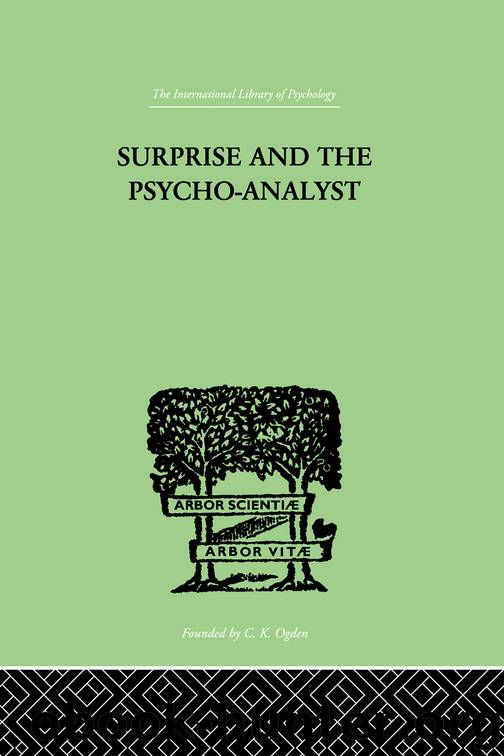Surprise And The Psycho-Analyst by Reik Theodor

Author:Reik, Theodor
Language: eng
Format: epub
ISBN: 978-1-136-30857-4
Publisher: Taylor & Francis Ltd
CHAPTER XII
THE QUESTION OF EVIDENCE—CONJECTURE AND COMPREHENSION
WHAT criteria have we by which to judge whether an idea occurring to the psycho-analyst is really in keeping with the true unconscious situation, or whether it must be simply ascribed to his fancy, his arbitrary desire, or his preconceived notions? The answer is, that, with one exception, there are no direct and objective criteria, equivalent to those applied in chemistry or any of the other natural sciences, none, at least, of such a nature that every thinking mind must recognize them without the slightest doubt. If we mix a certain substance with another in the test-tube and observe unequivocally a certain reaction, we can say positively that the original substance was such and such. There is no analogous case in the analytical process, for a determined sceptic to whom we point out that, say, the explanation and analytical treatment of a vehemently repressed impulse has effected a radical change in the patient’s inner life, can always retort: there is no guarantee that the change is due just to the said process. Success cannot decide the question.
Does it give us any objective surety that our unspoken psychological assumption occurs simultaneously or later to the patient, independently, that is to say? Certainly not; his mind may have been prepared for a similar idea by something previously said or read, he may have acquired his knowledge from psychological experience of other people, or, lastly, he may have conjectured our thoughts by telepathy. There is no objective, immediate, and indubitable proof that our interpretation has really hit upon the unconscious reality in the patient’s mind, has demonstrated the effect of the particular impulse in the psychical result, and conjectured the repressed nature of interrelated phenomena. The sole exception which a consistent sceptic might perhaps admit would be our inferring an event, a date, a fact, which we could not possibly have known otherwise. Let us suppose by way of example that our analytical idea represented the essential factor in the reconstruction of events having reference to the patient’s childhood, and that it assumed an event of which we had no knowledge from any other source, and which was confirmed by a third party.
If, then, we can seldom have objective proof that our idea corresponds to the unconscious facts, would it not be better to dispense with such “ideas” that just come to us, and simply to trust, in the process of analysis, to what our assured and conscious knowledge of psychology and neurology tells us? What kind of a science is it that goes to work with involuntarily occurring ideas, and uses the unconscious of the investigator as recipient, instead of the conscious, critical reason? Has this science so little respect for empirical methods? Does it overstep the limits within which reason is acknowledged as the supreme principle?
I expect these reproaches from opponents who are unacquainted with the essential character of analysis. I am more surprised when some analysts, who really ought to be better informed about
Download
This site does not store any files on its server. We only index and link to content provided by other sites. Please contact the content providers to delete copyright contents if any and email us, we'll remove relevant links or contents immediately.
Should I Stay or Should I Go? by Ramani Durvasula(7673)
Why We Sleep: Unlocking the Power of Sleep and Dreams by Matthew Walker(6727)
Fear by Osho(4741)
Flow by Mihaly Csikszentmihalyi(4700)
Rising Strong by Brene Brown(4465)
Why We Sleep by Matthew Walker(4449)
The Hacking of the American Mind by Robert H. Lustig(4386)
How to Change Your Mind by Michael Pollan(4358)
Too Much and Not the Mood by Durga Chew-Bose(4349)
Lost Connections by Johann Hari(4192)
He's Just Not That Into You by Greg Behrendt & Liz Tuccillo(3902)
Evolve Your Brain by Joe Dispenza(3680)
The Courage to Be Disliked by Ichiro Kishimi & Fumitake Koga(3507)
Crazy Is My Superpower by A.J. Mendez Brooks(3408)
In Cold Blood by Truman Capote(3388)
Resisting Happiness by Matthew Kelly(3342)
What If This Were Enough? by Heather Havrilesky(3313)
The Book of Human Emotions by Tiffany Watt Smith(3311)
Descartes' Error by Antonio Damasio(3280)
